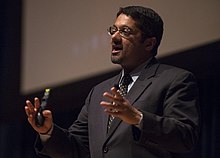User:AlexandraWeed/sandbox
Shankar Vedantam | |
|---|---|
 Vedantam in 2016 | |
| Occupation | Journalist |
Shankar Vedantam is an American journalist, writer, and science correspondent for NPR. His reporting focuses on human behavior and the social sciences.[1]
Education[edit]
Vedantam earned an undergraduate degree in Electronics Engineering in India, and a master's degree in Journalism at Stanford University in the United States.[2][3]
Journalistic Career[edit]
Vedantam's work connects social science research to real life situations. Vedantam creates works relevant for both journalists and researchers to improve their understanding of social science research but in a way that the average individual can read and interpret.[4] Vedantam’s journalistic approach is too engaged and inform the average reader to understand social science issues and how they effect the public. Vedantam's approaches to social science research is unique because most often this the public is not informed of issues relevant to them because concepts are too intricate to understand. [5]
Vedantam was a participant in the 2002-2003 Rosalynn Carter Mental Health Journalism Fellowship, the 2003-2004 World Health Organization Journalism Fellowship, and the 2005 Templeton-Cambridge Fellowship on Science and Religion.[1] He was a 2009-2010 Nieman Fellow.[6][1] He worked at The Washington Post from 2001 to 2011,[7][1] writing its "Department of Human Behavior" column from 2007 to 2009.[1] He then wrote an occasional column called "Hidden Brain" for Slate.[1] In 2005 Vedantam wrote the book, entitled, The Ghosts of Kashmir, a group of short stories, discusses how the divide between the Indians and Pakistani are actually very common despite the rift due to history and politics. [8]
Alongside informing the public and his contributions to many notable publications, in 2010, Vedantam published the book, entitled, The Hidden Brian. [9] The novel focuses on how people are influenced by their unconscious biases while encourperating his expirences working as a reporter at the Washington post. The novel provides readers real life examples on how their biases affect them without knowing. The book uses a wide range of examples to show how biases affect people and situations even including war or genocide in comparison to mental health. The novel is broken up by nine chapters touching on the topics of, myths, intentions, race, mental disorders, privilege, gender and how conformity affects unconscious biases. [10]
He joined NPR in 2011.[1] Since September 2015, he has hosted the NPR social sciences podcast Hidden Brain, where he "reveals the unconscious patterns that drive human behavior, the biases that shape our choices, and the triggers that direct the course of our relationships."[11] The famous podcast has engaged, per week, more than two million downloads. The podcast is aired on 250 radio stations within the United States. [12]
He has lectured at Harvard University and Columbia University, served on the advisory board of the Templeton-Cambridge Fellowships in Science & Religion, and been a senior scholar at the Woodrow Wilson International Center for Scholars in Washington.[1]
Literary career[edit]
Vedantam has written plays, fiction and nonfiction. His comedy Tom, Dick and Harriet was produced by the Brick Playhouse in Philadelphia in 2004, and his collection of short stories, The Ghosts of Kashmir, was published in 2005. His nonfiction book, The Hidden Brain: How our Unconscious Minds Elect Presidents, Control Markets, Wage Wars and Save Our Lives, was published in 2010.[1]
Awards and Honors[edit]
Awards:
- Hidden Brain: Edward R. Murrow Award
Honors:
- The American Association
- The Society for Personality and Social Psychology
- The International Society of Political Psychology
- The Society of Professional Journalists
- The National Association of Black Journalists
- The Austen Riggs Center,
- The American Psychoanalytic Association
- The Webby Awards
- The Pennsylvania Associated Press Managing Editors
- The South Asian Journalists Association
- The Asian American Journalists Association
- The Pennsylvania Newspaper Association
- The American Public Health Association
- The Templeton-Cambridge
- Rosalynn Carter Mental Health Journalism [12]
References[edit]
- ^ a b c d e f g h i "NPR "full bio"". National Public Radio.
- ^ "NPR 'Hidden Brain' correspondent Shankar Vedantam to speak at Nov. 10 SMU Tate lecture - SMU". www.smu.edu. Southern Methodist University. November 10, 2015.
- ^ "MIT TechTV – Denialism: Media in the Age of Disinformation". techtv.mit.edu.
- ^ Powers, Mitch Teich, Joy. "Shankar Vedantam: Connecting Social Science Research and the Real World". www.wuwm.com. Retrieved 2020-02-18.
{{cite web}}: CS1 maint: multiple names: authors list (link) - ^ Wright, Charles. "Access to Social Science Data in Commercial Communications Reports". Public Opinion Quarterly. 28.
- ^ Benton, Joshua (May 19, 2009). "Meet the new Nieman Fellows". niemanlab.org.
- ^ Romenesko, Jim (May 5, 2011). "Five Washington Post departures announced today". Poynter.org. Archived from the original on 2014-09-03. Retrieved 2014-08-29.
- ^ Vedantam, Shankar (2006). The Ghosts of Kashmir.
- ^ "Shankar Vedantam". Psychology Today. Retrieved 2020-02-18.
- ^ Vedantam, Shankar (2010). The Hidden Brain.
- ^ "Hidden Brain". npr.org.
- ^ a b "Shankar Vedantam". NPR.org. Retrieved 2020-02-18.
External links[edit]
- "Shankar Vedantam on Bias in Reporting". Columbia Journalism Review.
Category:American reporters and correspondents
Category:Living people
Category:NPR personalities
Category:Stanford University alumni
Category:The Washington Post people
Category:American columnists
Category:Year of birth missing (living people)
Category:American male journalists
Category:21st-century American journalists
Category:21st-century American male writers
~~~~ Comments: Overall nice job and good contributions! The revisions could include more information about his studies or his own contributions to his field; since the four sources we need to use to write our edits also need to be peer reviewed, it might be easier to fit this criteria if you expand on some of his research or journalism projects.
